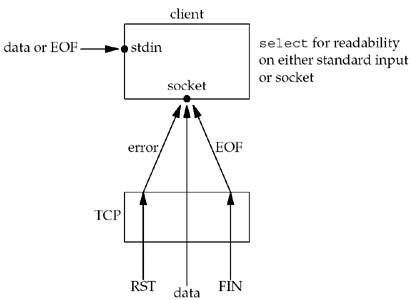6.4 str_cli Function
(Revisited)
We can now rewrite our str_cli function
from Section 5.5, this
time using select, so we are notified as soon as the
server process terminates. The problem with that earlier version
was that we could be blocked in the call to fgets when
something happened on the socket. Our new version blocks in a call
to select instead, waiting for either standard input or
the socket to be readable. Figure 6.8 shows the various conditions that are
handled by our call to select.

Three conditions are handled with the
socket:
-
If the peer TCP
sends data, the socket becomes readable and read returns
greater than 0 (i.e., the number of bytes of data).
-
If the peer TCP
sends a FIN (the peer process terminates), the socket becomes
readable and read returns 0 (EOF).
-
If the peer TCP
sends an RST (the peer host has crashed and rebooted), the socket
becomes readable, read returns 鈥?, and errno
contains the specific error code.
Figure
6.9 shows the source code for this new version.
Figure 6.9
Implementation of str_cli function using select
(improved in Figure 6.13).
select/strcliselect01.c
1 #include "unp.h"
2 void
3 str_cli(FILE *fp, int sockfd)
4 {
5 int maxfdp1;
6 fd_set rset;
7 char sendline[MAXLINE], recvline[MAXLINE];
8 FD_ZERO(&rset);
9 for ( ; ; ) {
10 FD_SET(fileno(fp), &rset);
11 FD_SET(sockfd, &rset);
12 maxfdp1 = max(fileno(fp), sockfd) + 1;
13 Select(maxfdp1, &rset, NULL, NULL, NULL);
14 if (FD_ISSET(sockfd, &rset)) { /* socket is readable */
15 if (Readline(sockfd, recvline, MAXLINE) == 0)
16 err_quit("str_cli: server terminated prematurely");
17 Fputs(recvline, stdout);
18 }
19 if (FD_ISSET(fileno(fp), &rset)) { /* input is readable */
20 if (Fgets(sendline, MAXLINE, fp) == NULL)
21 return; /* all done */
22 Writen(sockfd, sendline, strlen(sendline));
23 }
24 }
25 }
Call select
8鈥?3
We only need one descriptor set鈥攖o check for readability. This set
is initialized by FD_ZERO and then two bits are turned on
using FD_SET: the bit corresponding to the standard I/O
file pointer, fp, and the bit corresponding to the socket,
sockfd. The function fileno converts a standard
I/O file pointer into its corresponding descriptor. select
(and poll) work only with descriptors.
select is called after calculating the
maximum of the two descriptors. In the call, the write-set pointer
and the exception-set pointer are both null pointers. The final
argument (the time limit) is also a null pointer since we want the
call to block until something is ready.
Handle readable socket
14鈥?8
If, on return from select, the socket is readable, the
echoed line is read with readline and output by
fputs.
Handle readable input
19鈥?3
If the standard input is readable, a line is read by fgets
and written to the socket using writen.
Notice that the same four I/O functions are used
as in Figure 5.5,
fgets, writen, readline, and
fputs, but the order of flow within the function has
changed. Instead of the function flow being driven by the call to
fgets, it is now driven by the call to select.
With only a few additional lines of code in Figure 6.9, compared to Figure 5.5, we
have added greatly to the robustness of our client.

|